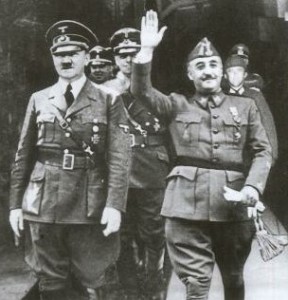Guardian covers dictionary controversy
 The Guardian‘s Giles Tremlett covers the controversy surrounding Spain’s newly issued national biographical dictionary, in which the biography of Franco was assigned to a well-known apologist for the dictator (a term that said apologist refused to apply to his subject). An increasing number of academics and politicians are calling for a withdrawal and re-write:
The Guardian‘s Giles Tremlett covers the controversy surrounding Spain’s newly issued national biographical dictionary, in which the biography of Franco was assigned to a well-known apologist for the dictator (a term that said apologist refused to apply to his subject). An increasing number of academics and politicians are calling for a withdrawal and re-write:
After 12 years’ work and more than €6.5m (£5.7m) in taxpayers’ money, the first volumes of the encyclopaedia were unveiled last week only for readers to discover that the dictator’s biography had been written by Professor Luis Suárez, an 86-year-old Franco apologist who is better known as a medievalist. The entry describes how Franco “became famous for the cold courage which he showed in the field” while a young officer in Africa, and goes on to say that his brutal years in power saw him “set up a regime that was authoritarian, but not totalitarian.” But Suárez failed to mention the tens of thousands of people killed during the Francoist era and refused to describe him as a dictator, arguing he had been authoritarian rather than totalitarian. … Suárez is an acquaintance of the Franco family and a senior figure in the Brotherhood of the Valley of the Fallen. The group, which takes its name from the controversial underground basilica where the dictator was buried in 1975, is actively opposed to the so-called “historical memory” movement in Spain, which has recently been searching for, and digging up, the mass graves of the victims of Francoist death squads. For many years, Suárez was one of the few historians allowed by Franco’s family to study the personal papers of the man most Spaniards recognise as having been the country’s dictator for 36 years from 1939. In 2005, Suárez, after a career spent studying the 15th and 16th centuries, published a biography of the dictator.














